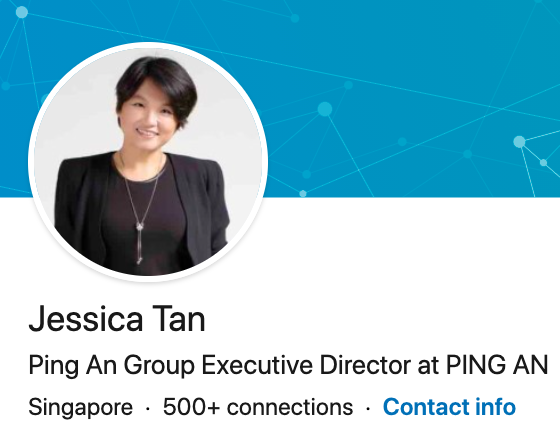Singapore—The second most powerful woman in the world according to Fortune media, is a businesswoman from Singapore. No, we’re not talking about Madam Ho Ching, the Chief Executive Officer of Temasek Holdings and wife of Prime Minister Lee Hsien Loong, who is a powerhouse in her own right.
This year, Mdm Ho ranked 20th on Fortune’s list—a minor fall from her ranking as 17th in 2019, but it is nothing to sniff at. Fortune’s list shows that someone more powerful than the Temasek CEO is Jessica Tan, co-CEO and Executive Director at Ping An Group, China’s largest insurer and a banking, insurance, and financial services conglomerate, although, perhaps everyday Singaporeans would likely be hard-pressed to recognize her.
According to Fortune’s list, which was released last month, Ms Tan comes second only to the United Kingdom’s Emma Walmsley, the CEO of pharmaceuticals powerhouse GlaxoSmithKline, which found itself in the spotlight this year as the race to find a Covid-19 vaccine heated up.
But going back to the 43-year-old Ms Tan, in 2019, she skyrocketed all the way to number four on the list, the first year she was included. In the same year, she was also included in “The World’s 100 Most Powerful Women 2019” list of Forbes Magazine for the first time, ranking twenty-second.
And while she is a Singaporean citizen, she is listed under China due to her position at the Ping An Group.
Ms Tan’s entry on the Fortune list reads:
“Ping An is nominally an insurance company. But the pandemic has underscored its technological prowess and gone a long way to fulfill the ‘technology-plus-finance’ vision that Tan, an MIT and McKinsey alum, has for the company. Demand for its Good Doctor telehealth platform boomed as COVID-19 spread in China in early 2020: In the first half of the year, Good Doctor saw a 26.7% increase year on year in medical consultations as patients avoided hospitals and hands-on care. Other parts of Ping An’s sprawling business are also benefiting from rapid digitalization. Its smart-city arm is helping 118 cities in China digitize their government services as citizens remain wary of in-person interactions. Ping An’s hometown of Shenzhen, for instance, is aiming to deliver 7,000 services on a single app.”
Ms Tan was educated at the Massachusetts Institute of Technology (MIT), where she graduated with a a Master’s degree in Electrical Engineering and Computer Science and two Bachelor’s degrees in Electrical Engineering and Economics.
She joined Ping An in 2013. In January of 2014 she was made a director of Ping An Bank and in December of that year she became the Chief Information Officer and President and CEO of Ping An Technology (Shenzhen) Co. Ltd. In January 2016 she became the Executive Vice President of the Company. By 2018, she became the firm’s co-CEO.
In an interview with The Straits Times (ST) on Nov 1 (Sunday), Ms Tan said that she would fly home from Shenzhen every weekend, but since the beginning of the pandemic, she has only been in the country four times.
She is the mother of two girls aged 11 and 14, whom she teaches to be unafraid of taking risks.
ST quotes her as saying, “I’ve learnt to be more thick-skinned. I always tell my girls we should be more risk-taking, and not be afraid to ask for things and go for it.
There are many areas where you can take your own initiative, to shape and do what you think is meaningful.
This way, you get to do many more things. And it’s also a lot more fun.” —/TISG
Read also: Ho Ching slips to 20th spot in Fortune’s “Most Powerful Women International” list
Ho Ching remains Temasek CEO nearly a decade after failed leadership succession plans

